Legends and characters of Brazilian folklore are cultural elements that occupy the imagination of the inhabitants of different regions of Brazil. These stories about supernatural beings have been part of our culture for centuries. There are several legends and folkloric characters in Brazil, such as the boitatá, the pink river dolphin, the caboclo d’água, the curupira, the iara, the water lily, the headless mule, the shepherding negrinho, the saci and the enchanted city in Jericoacoara.
Read too: Brazilian folklore — the set of manifestations that are part of Brazilian popular culture
Topics of this article
- 1 - 1. Boitatá
- 2 - 2. pink river dolphin
- 3 - 3. caboclo d'água
- 4 - 4. curupira
- 5 - 5. yara
- 6 - 6. lily pad
- 7 - 7. Headless mule
- 8 - 8. shepherding black
- 9 - 9. Saci
- 10 - 10. The enchanted city in Jericoacoara
- 11 - Other legends of Brazilian folklore
1. Boitatá
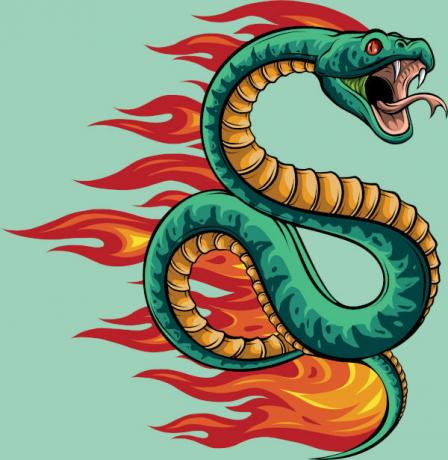
Indigenous legend, the boitatá is a brilliant serpent. He is more of a protector of the forest, he takes care of the fauna and flora. He
fools the environment aggressor and metamorphoses into a burning log. Finally, it can burn the forest enemy. The one who survives and has the bad luck to look into the entity's eyes, becomes blind.The fire snake, wherever it goes, lights up the forest. The boitatá is an old legend. The first records of its existence were made in the 16th century. One version of the legend says that the boitatá was a large snake that, after eating the eyes of many animals, acquired a strong glow. To learn more about this legend, click here.
2. pink river dolphin

This legend from northern Brazil says that, during the June festivities, the pink river dolphin turns into a very handsome man who is always wearing a hat, as its porpoise nostrils are on top of its head.
Upon meeting a woman he finds attractive, he seduces and impregnates her.. After that, she never sees the child's father again. For this reason, when a young woman becomes pregnant during these festivities and it is not known who the father of her child is, people say that he is the son of a boto. Thus, every handsome man who appears wearing a hat ends up being the target of general distrust. To learn more about the legend of the pink dolphin, click here.
3. caboclo d'água
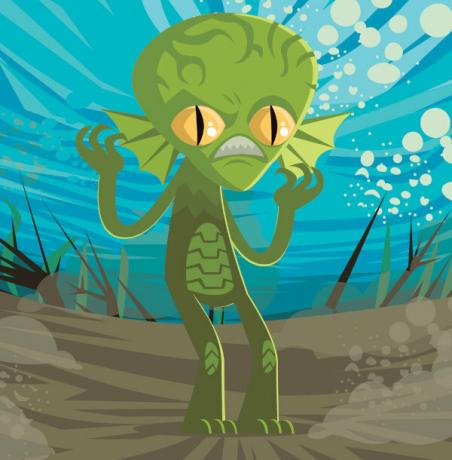
Of Minas Gerais origin, this legend says that the water caboclo is a large, copper-colored creature with long, black hair. He lives at the bottom of the São Francisco River. He grabs people in canoes and takes them to the bottom of the river, where he devours them. He capsizes canoes, scares fishermen and protects fish.
Legend has it that, to ward off this frightening being, it is necessary to stick a knife in the bottom of the canoe. However, there are cases of people who became friends with the water caboclo, who even greets them when he sees them passing by in a boat. The fact is that, in the north of Minas, there are many people who swear to have seen such a water caboclo.
4. curupira
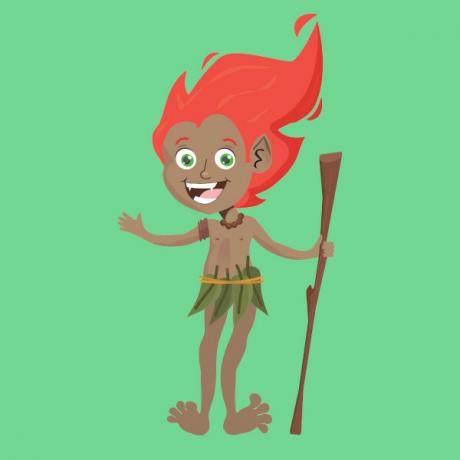
Indigenous legend, the curupira It is a creature whose function is to protect the forest, its trees and its animals., being described in different ways over the centuries. After all, in the 16th century, there were already references to this legendary being. The best known characteristics of the curupira are: the appearance of an indigenous boy, with the body covered in hair and the feet turned backwards.
In this way, he confuses its pursuers, as its footprints point the wrong way. Thus, the curupira is an enemy of hunters and woodcutters. To learn more about this legend, click here.
5. yara

Legend originating in the north of the country, the iara she is a freshwater mermaid. It therefore lives at the bottom of rivers. She is a beautiful indigenous woman with long black hair. However, from the waist down, she is shaped like a fish. She usually sunbathes on the river rocks in the afternoons. And she has the power to seduce men with her magical singing. In this way, the iara she takes the men she seduces to the bottom of the river, and they never come back. To learn more about the legend of the iara, click here.
6. lily pad

This legend from the North of Brazil says that the indigenous Naiá fell in love with the Moon (Jaci). Periodically, Jaci would go down and choose a virgin to be a star and keep her company, and Naiá really wanted to become a star to be with Jaci. That's why she said "no" to all her suitors. During the night, she lived with her eyes on the sky, in love with Jaci.
The young woman even got sick from being so sad, as Jaci didn't seem to care about her. One night, she was near a river and saw the reflection of the moon in the water. To touch the moon, she jumped into the water and ended up drowning..
Jaci then felt sorry for the young indigenous woman and turned her into a flower., the water lily, the water star. Therefore, the lily pad only opens during moonlit nights. To learn more about the legend of the water lily, click here.
7. Headless mule
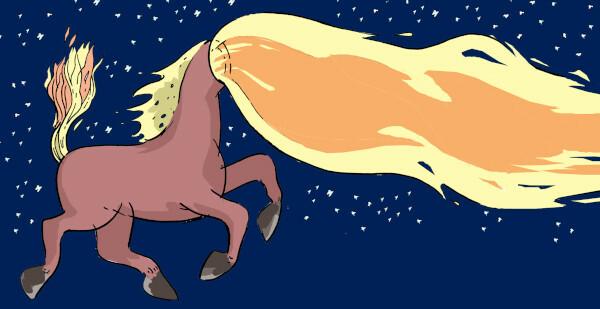
The headless mule is an entity that usually makes its appearance near churches. Another way to see this character from Brazilian folklore is to run past a cross at midnight. Legend has it that the headless mule is a woman who was punished for having a romantic relationship with a priest.
When it's dawn from Thursday to Friday, she goes to a crossroads, where she turns into this scary being. There are those who say that the mule has a head and shoots fire from its nostrils. And if you are unlucky enough to meet this legendary character, you have to lie on your stomach and hide your nails and teeth. Only then will it survive. To learn more about the legend of the headless mule, click here.
8. shepherding black

This legend originally from the south of Brazil tells the story of a cruel farmer who mistreated enslaved blacks. During a harsh winter, he ordered a 14-year-old black boy to herd some horses. When the boy returned from work, the farmer he noticed that one of the horses was missing.
The boy was then whipped until he bled. And the farmer even demanded that the boy find the lost horse. The boy went in search of the animal. He found the horse, but the animal broke free of the noose and ran away again. Upon learning what had happened, the farmer hit the boy a lot. He stripped the boy of his clothes and tied him to an anthill..
The next day, when he went to check the result of his wickedness, the farmer was surprised. Accompanied by the Virgin Mary, the boy was intact and healed of all wounds.. So the farmer knelt down, asking for forgiveness, but the boy didn't answer, just got on the lost horse and left. To find out more about the legend of the black shepherd, click here.
9. Saci
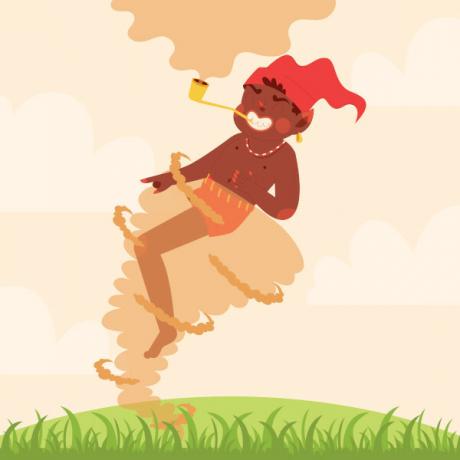
Emerged in the eighteenth century, the legend makes reference to a black boy, with a red cap, who always smokes a pipe and has only one leg. This folkloric character is sometimes described as mischievous, sometimes as malevolent. It is the red cap that gives him supernatural powers.
Pererê is the black colored saci. Trique is the dark Saci. Saçurá is the red-eyed saci. Like this, this folk entity likes to make people hell. Hides things, disturbs animals and does other mischief. It can also be found in whirlpools. They say that if someone throws a sieve or a rosary there, they can imprison the saci.
10. The enchanted city in Jericoacoara

This legend from Northeast Brazil tells of a magical city located under Morro do Farol, in the city of Jericoacoara in Ceará. In this enchanted kingdom lives a beautiful princess. The entrance is in a cave, where you can find an iron gate. However, whoever manages to get through the gate will come across a golden serpent.
She is the princess, who keeps the feet and head of a woman. Her curse ends when there is a human sacrifice at the gate. The blood must be used to make a cross over the serpent, which will then have the spell broken. On that day, the city will be visible to everyone. And the man who ends the enchantment will marry the beautiful princess and enjoy her riches.
Do not stop now... There's more after the publicity ;)
Other Legends of Brazilian Folklore
Legend |
History |
rise of night |
Of indigenous origin, it explains how the night woke up at the origin of the world, when there was only day. |
bonnet |
Of indigenous origin, it talks about boiuna, the big snake, lady of the river where it lives. |
Zaoris |
Native to southern Brazil, she claims that the Zaoris (children born on Good Friday) can see in the dark or through stone, wood or iron. |
Pirarucu |
Originally from the North of Brazil, it is said that the pirarucu fish was an indigenous person from the tribe of the Uaiás, a bad-natured warrior, transformed into a fish by Tupã. |
Myth of the Sun |
Of indigenous origin, she explains that Sol was an indigenous person who, upon seeing the boiling urucu, drank the red liquid, and it turned red too. Thus, it ended up rising to the sky and started to illuminate and heat the planet. |
Cassava |
Originally from the North of Brazil, she says that an indigenous woman was expelled from the tribe for getting pregnant by a stranger. Alone, she gave birth to a very white girl named Mani, who died at just three years old. From the place where she was buried, a plant with white roots was born, which served as food for the indigenous people. |
Guarana |
Originally from the North of Brazil, she says that an indigenous couple asked Tupã for a child. After the boy was born, he fell victim to the envy of the god Jurupari, who killed him. The mother then, by order of Tupã, planted her son's eyes, and from there guarana was born. |
Cuca |
A legend imported from Portugal, the cuca is a witch who looks like an alligator (originally a dragon). She kidnaps disobedient children. |
anhangá |
Legend of indigenous origin, anhangá is a spirit that takes the form of a white deer, which protects the animals of the forest. |
Sources
ALVES, Maria José de Castro; PEREIRA, Maria Antonieta (coord.). Legends and Myths of Brazil. Belo Horizonte: Faculty of Letters of UFMG, 2007.
ARAÚJO, Denise Felipe Carvalho de; LIMA, Edivania Ferreira. The contribution of folklore in children's literature classes. 2005. TCC (Graduation in Pedagogy) – University Center of Brasília, Brasília, 2005.
FRITZEN, Vanessa. indigenous myths in Macunaíma, by Mario de Andrade. Uniabeu Letters Course Magazine, Nilópolis, v. 4, no. 3, May/Aug. 2013.
LEONARDELI, Poliana Bernabé. Popular culture in Monteiro Lobato's children's narrative. Digital Seminal Notebook, v. 35, no. 35, Jul./Dec. 2020.
LUCAS, Eduardo (org.). brazilian legends: boitata. Vitória: Music on the Network, 2020.
NETO, Eraldo Medeiros Costa; SANTOS-FITA, Dídac; AGUIAR, Leonardo Matheus Pereira. Curupira and Caipora: the role of elemental beings as guardians of nature. Emílio Goeldi Museum Bulletin, v. 18, no. 1, 2023.
SOUZA, Flavio de. Nine dangerous, powerful, fabulous monsters from Brazil: Brazilian folkloric legends. São Paulo: Companhia das Letrinhas, 2015.
Click to learn more about the commemorative date of Folklore Day. Understand the meaning of the date and its creation context.
Who has never been afraid of the bogeyman? Click here and learn about the legends of the bogeyman around the world.
Learn more about the caipora, a traditional character in Brazilian folklore. Understand the role she plays and learn about different versions of her legend.
Click on the link to learn about corpo-seco, a legend of Brazilian folklore. Understand the characteristics of this legend, and see the regions where it is popular.
Learn more about Cuca, one of the most traditional legends of Brazilian folklore. Understand how this being is represented.
Access and learn more about Brazilian folklore. See the studies produced in the area and meet characters and manifestations of our folklore.
Click on the link to get to know the tutu, a monster present in Brazilian folklore that appeared in lullabies and was related to the boogeyman.



